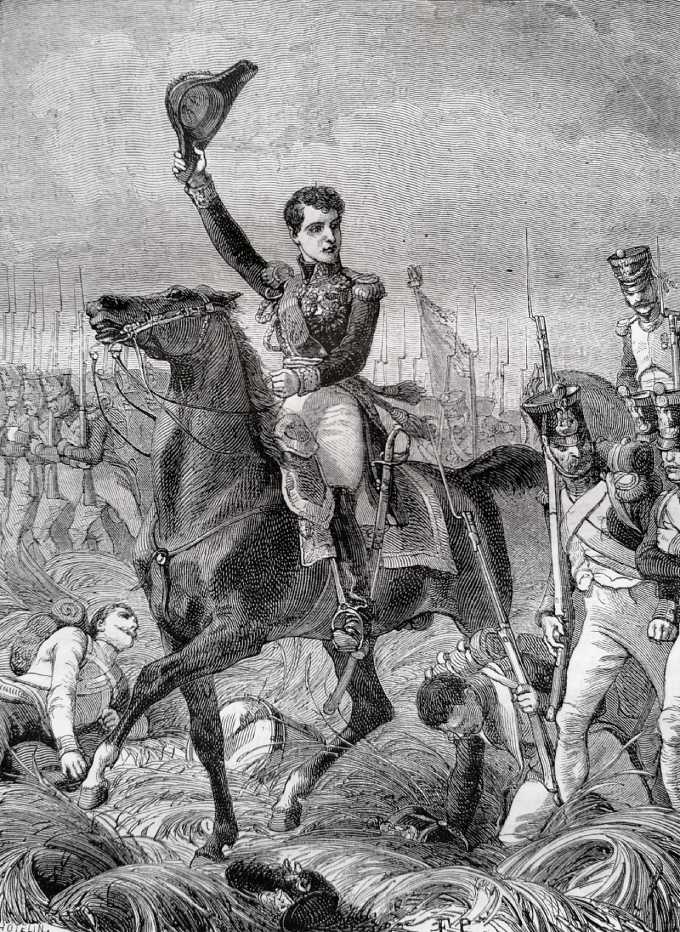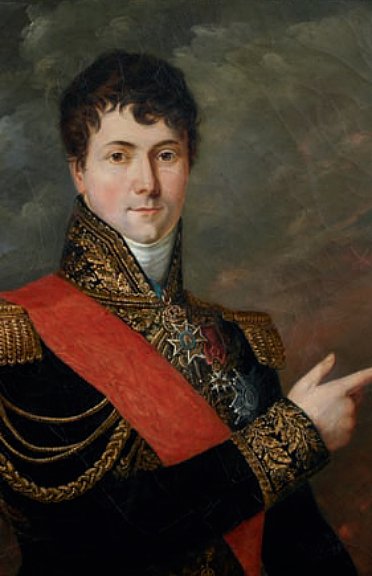General Gudin was one of Napoleon’s most respected generals, and held a very special place in his heart. The French Emperor allowed Gudin to use the familiar “tu” to address him on the battlefield. A rare privilege, since not even marshals dared use the informal mode of address. Theirs was a unique bond that spanned the whole of Napoleon’s French career.
Charles-Etienne Gudin de La Sablonniere was born in 1768 to a noble family at Montargis, south of Paris. He got to know the 10-year-old Napoleon Bonaparte at the military academy in Brienne, where they both studied. Gudin was a year older. The aristocrat took the small Corsican, who was being bullied for his foreignness, under his wing.
Gudin’s military career started out in the final years of Louis XVI’s reign. He served first as an unpaid gendarme in the King’s household in 1782 before joining his uncle’s Artois regiment as a Second Lieutenant in 1784.
When the tide turned against the monarchy after 1789, the overwhelming majority of aristocratic officers were guillotined or fled France’s Revolutionary army; Charles-Etienne Gudin was one of the few who stayed on. He was sent to France’s Caribbean possession of Saint Domingue to quash a slave insurgency in 1791.
Upon his return to France in 1792, he assisted his uncle, now a general, as an aide-de-camp in the Army of the Ardennes fighting the anti-Revolutionary coalition of European monarchies. Gudin then rose through the ranks in the Army of the Rhine, which gave its name to France’s national anthem.
By the time Napoleon Bonaparte had seized power as First Consul in 1799, his childhood associate had been named General de brigade. The fact that Napoleon had not “created” Gudin explains why he respected him as a soldier. “From his first campaigns, he had shown his offensive character and his ability to obtain the best from his men while taking care to preserve their lives,” the Napoleon Foundation claims.

His friend continued to prove his valour as Napoleon’s armies took Europe by storm. Gudin served in the avant-garde of Marshal Davout, the Great Army’s most efficient marshal, fighting on German and Polish soil. He helped France achieve an impossible victory at the battle of Auerstedt in 1806 where he was wounded, and as a reward the general’s division was allowed to enter Berlin at the front of the military march.
Gudin became known as one of Napoleon’s “Immortals”, that is a general who had never been defeated. He was made a Count of Empire in 1808. The following year, he led his division from the front at the battle of Wagram, where he was shot four times. Napoleon awarded Gudin his highest distinction, that of the “Great Eagle” in the Legion of Honour, and made him governor of Fontainebleau, his favourite chateau.
When Napoleon invaded Russia in the August 1812, Gudin was back in service under the emperor’s direct command. He helped take Smolensk on 17 August. Two days later, he was ordered to help Marshal Ney at Valutina Gora. When they met up, the marshal put pressure on Gudin to take unnecessary risks; the general allegedly retorted: “You shall see how my division knows how to take a position when it’s been given the mission of attacking it!”
Led by Gudin, his division made several attempts to cross the Strogan river. The opposite embankment was defended by Russian jaegers and grenadiers, and Gudin’s men were pushed back every time onto the boggy bank of the stream. Finally, having dismounted to cross it, the general was caught up in a Russian volley of fire. He was hit by a cannonball, which shattered one thigh and damaged his other ankle. As he was haemorrhaging, Gudin designated his replacement, and was taken to Smolensk where the Great Army’s principal surgeons amputated what remained of the shattered leg.
Napoleon himself stood vigil by his old friend’s side as he lay dying, and promised he would be like a father to his orphaned children. On August 22, Gudin succumbed to gangrene and loss of blood. The battle-hardened military strategist cried. So did the reputedly cold-hearted Davout.
With Smolensk still in flames, a grand funeral was arranged in the citadel, attended by the elite troops of the Imperial Guard. The entire Great Army felt keenly the loss of this well-liked general. They had not yet grown used to losing men. The next day, Napoleon praised him in despatches: “General Gudin was one of the Army’s most distinguished officers: he was commendable for his character as much as for his bravery and boldness”. He declared that he had been planning to make Gudin a marshal.
Gudin's heart was extracted from his body and taken back to France. It was buried in Paris' famous Pere Lachise cemetery.
His death did not sever the link between the general’s family and Napoleon. The Emperor wrote a rare personal letter of condolence to Jeanne Caroline Creutzer, Gudin’s wife, the sister of a German general. “Madam, Countess Gudin, I share your regrets: the loss is a great one for you; it is for me too. You and your children will always have a claim on me […] Bring them up in the sentiments that make them worthy of their father,” he pleaded.
He bestowed on her the highest pension awarded to a general’s widow, and promised to take care of Gudin’s five children. Their eldest son, Charles Gabriel Cesar (1798-1874), became one of his pages. In 1815, he assisted wounded Prussian soldiers after the battle of Ligny, Napoleon’s last victory. “Young Gudin distinguished himself by his mercifulness,” the former emperor recalled. Gudin’s son was still serving the French conqueror during his final showdown at the Battle of Waterloo the next day.
